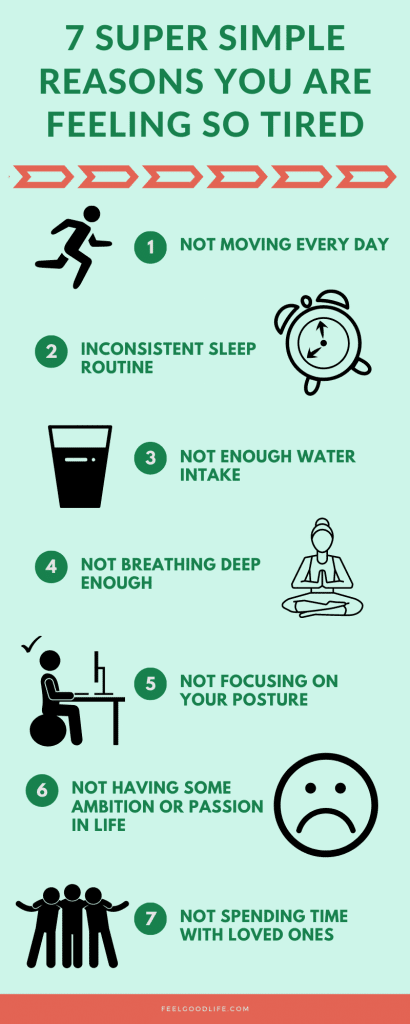Free download: Top 10 Natural & Easy Remedies for Joint Pain from Home. Learn these helpful remedies.
Estimated Reading Time: 7 minutes read
“Why am I am feeling so tired all the time?”
It feels like we ask ourselves this question every day, and when searching for an answer, Google churns out so many possible medical problems… we begin to wonder if this isn’t the end for us.
HINT: It’s not.
There is a myriad of non-medical reasons why we often feel so tired on a daily basis.
From something as simple as living like a cactus and forgetting to drink water to the more delicate cause of not seeing our favorite people enough, chronic fatigue can easily be avoided by changing our daily habits.
Table of Contents
7 Simple Reasons You Are Feeling So Tired, Plus How to Fix Them

1. Not Moving Every Day
Our bodies were indeed made to move, but we often land in two extreme camps when it comes to exercise.
Both too much and too little can create signs of fatigue.
And, when we get this feeling of exhaustion, we most likely want to lie around on the couch or even binge Netflix for a bit, but participating in physical activity on a regular basis can help to increase our energy and reduce those fatigue symptoms.
If getting up and moving is tough for you, try adding in a 10-minute walk before or after lunch or incorporate a low-impact workout 3 days a week.
The key is to find something you enjoy. And, as an added bonus, getting some form of physical activity every day can also reduce anxiety and promote a positive mood, thereby targeting another common cause of tiredness.
2. Inconsistent Sleep Routine

Consistently averaging less than 7-8 hours a night probably means our bodies haven’t recovered from yesterday’s stress… and it’s continuing to drain your energy throughout today.
Our circadian rhythm, a.k.a the body’s internal clock, tells our body when it’s time to wake up in the morning and when to start unwinding at the end of the day.
But when we constantly disrupt this cycle by staying up too late or trying to shorten our natural sleep window, we throw our rhythm off — forcing our bodies to run off very little energy during the day.
How to fix this? Simple, keep a consistent sleep routine.
Start by creating a relaxing bedtime routine to unwind before bed. Create not only a consistent waking time but bedtime as well.
This will be the time you are to be tucked in and snoozing (not the time you start preparing for sleep).
Other great strategies to increase your quality of sleep are keeping your bedroom as dark, quiet, and cool as possible.
3. Not Enough Water Intake
Frankly put: we’re humans, not cacti. We can survive weeks without food but only days without water. It is essential to our survival, and yet, many of us neglect water… leading to chronic dehydration and fatigue.
When we’re dehydrated, our blood pressure can drop thus decreasing blood flow to the brain, making you feel sleepier than when hydrated.
Grab a bottle and start sipping! Sip water throughout the day — don’t just wait until you’re thirsty.
Opt for water instead of soda when out to eat, and try to get a glass in between meals to help keep you hydrated all day long.
4. Not Breathing Deep Enough

Seems strange right? What could our breathing — something we do almost unconsciously — have to do with our energy levels?
The answer is actually quite simple: our brains need oxygen to function.
When our brain doesn’t receive enough oxygen, our blood pressure raises, our hearts are forced to pump harder, and it takes more work for our bodies to function at their normal rate… leaving us chronically stressed and tired.
However, diaphragmatic breathing can lower blood pressure, reduce heart rate, relax muscles, decrease stress, and increase energy levels.
Practice this style of breathing by lying on your back with one hand covering your belly button and another over your heart.
As you inhale, push your stomach into your hand while keeping the hand on your chest still.
As you exhale, feel your stomach pull back towards your spine.
This ensures your lungs are filling to their peak capacity to supply loads of oxygen to the brain.
5. Not Focusing on Your Posture
Another factor affecting our breathing rate is our posture! While we may not focus on it until our neck or back begins to stiffen, poor posture has worse effects on our energy as well.
Not only can poor posture add stress and strain to our bodies, but it can also restrict our ability to take deep breaths, requiring more energy to compensate.
The more efficient we can be in our good posture, movement, and gait, the more we can improve our energy efficiency. Start by trying simple postural exercises.
Tip: Notice how your standing and sitting posture differ: standing requires not only the shoulders and hips be aligned but for the feet to be there as well (with weight evenly distributed among the entire foot).
Whereas proper seated posture requires more attention be placed on the core (belly button drawl towards the navel while keeping the shoulders stacked on top of the hips).
6. Not Having Some Ambition or Passion in Life

Losing our passion for everyday events can often lead to depression — a symptom of which is constant fatigue.
Depression is associated with changes among neurotransmitters in the brain.
These neurotransmitters — dopamine, norepinephrine, and serotonin — play important roles in regulating energy levels, sleep, appetite, motivation, and pleasure.
A slight dip in any one of these neurotransmitters may act to make us tired.
Start by talking to your doctor about whether or not you are struggling with clinical/seasonal depression and what you can do to help.
Other options to help increase your passion for life include performing previous tips from this article: exercising, improving sleep quality, drinking water, and eating a balanced diet.
7. Not Spending Time with Loved Ones
This is another option to help reduce feelings of depression. A social support network is comprised of family, friends, and peers.
And this network is key in helping you feel connected and energized for the day.
Having intimate relationships with others helps you feel cared for and maintain optimism, as well as aiding in certain types of stress management.
Pick up the phone and plan a weekly or monthly lunch with a good friend. Pick up the grandkids for a special play date.
Or, take your significant other out for a night on the town.
Be sure to choose the people closest to you who bring the most joy and energy… and avoid those who leave you feeling sad, frustrated, or exhausted.
By following the above tips, and avoiding your specific fatigue triggers, you can train your body on how to not be tired all the time.
But hey, sometimes a nice long nap helps too!
Remember, you don’t have to incorporate all of these strategies right now — start with the top 1-2 reasons you’re feeling fatigued and go from there.
See how you feel, and notice the changes you receive when you finally have the energy to take on the day.















2 Responses
Excellent material excellently presented.
Graded A+
Former teacher and librarian
Thanks Judy! 🙂